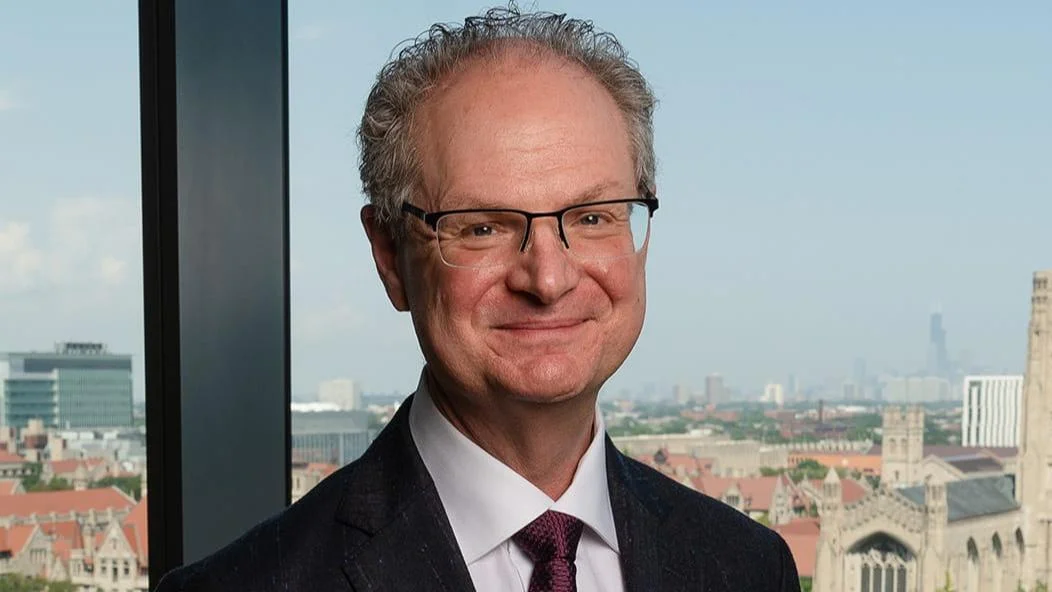Every summer, the University of Chicago Economics Department hosts a group of undergraduate economics students from Universidad Panamericana in Mexico City. The two-week program brings 23 rising juniors and seniors to campus for an intensive introduction to UChicago’s approach to economics.
The initiative, now in its fourth year, began through collaboration between UChicago Global and Panamericana’s international office. The program is designed not only as an academic exchange but also as part of the University’s broader efforts to strengthen international ties, especially in Latin America.
“When you think about economics, the University of Chicago is top of mind,” said Eugenio Gómez Alatorre, an economics professor at Panamericana involved with the partnership. “You have an amazing tradition of great thinkers in economics, a lot of knowledge that has been generated at this university, so we were very interested in partnering with the University of Chicago.”
Melissa Valles, a junior at Panamericana, described her experience learning where Nobel laureates once taught: “I’m seeing the root of so many things that I already learned at my university. I’m back in the place where these people—some Nobel Prize winners—were, and I was learning their formulas in my school. It’s insane to me that I’m here, in their school.”
The curriculum covers finance, price theory, experimental economics and macroeconomics. Taught by full-time lecturers from UChicago’s Department of Economics, students complete problem sets and unit tests while developing skills relevant for graduate study and professional careers.
Maria Lettiere, executive director of Summer Session in the College, said that the partnership serves as a model for short-term academic programs aimed at visiting students. Plans are underway to expand participation to more departments and universities across Latin America by 2026.
Visiting students noted that UChicago’s interactive teaching style made economic theory more accessible. Daniela Calzado explained: “It makes it way easier to understand things—and to actually make sense of them and know how to apply them to real life. I’ve had classes where I know the theory, but I don’t always know how to use it. Here, everything feels connected to something real.”
Calzado also highlighted discussions led by Victor Lima on game theory: “He was talking about it, and it was so interesting how you can basically explain everything with economics.”
Alatorre described UChicago’s approach as unique: “The University of Chicago has a different way of thinking about economics,” he said. "The methodology of economics can be applied to many different things, and that is an innovative way of thinking about it.”
Entrepreneurship sessions introduced students to recent graduates and business owners who shared their career paths beyond traditional finance roles.
“I learned so much from them. I like hearing the testimonies of people," said Valles. "Seeing people in their late 20s, seeing people that are doing those things, it really stuck with me—oh, I can do these things as well.”
Santiago Zúñiga noted how meeting recent graduates helped him imagine his own future: “I think you can picture yourself in them, because they’re not apart from you,” he said. “Maybe they’re graduates, but they’re not Mark Zuckerberg or Jeff Bezos—they’re just regular people trying to do something.”
For Calzado, who had previously ruled out entrepreneurship as a career option, these conversations prompted reconsideration: “I always told myself; I’m never going to go into that. I hate that stuff,” she said. “[But] after finishing that class, I actually considered if someday I get an idea, I might do it.”
At the end of two weeks, faculty held a certificate ceremony recognizing student achievements before participants returned home.
Valles reflected on her time at UChicago: “It’s so inspiring being around people that love these things and being in a place where you can feel the love for economics,” she said.
Alatorre emphasized how UChicago encourages broad applications for economic analysis: “The University of Chicago began analyzing problems that weren’t traditionally part of economics—like marriage or crime—through its methodology,” he said. “Students learn that this way of thinking can be applied far beyond markets.”
Zúñiga concluded: “It just reminded me why I chose economics and how much good I could do for the world,” he said.

